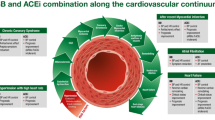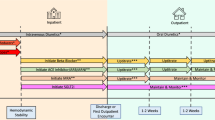Abstract
Aldosterone produces adverse effects on the vasculature (endothelial dysfunction) and on the myocardium (myocardial fibrosis). These effects have adverse clinical consequences that result in increases in deaths caused by sudden death and by progressive heart failure. The Randomized Aldactone Evaluation Study and the Eplerenone Post-acute Myocardial Infarction Heart Failure Efficacy and Survival Study show this clearly. Aldosterone blockade should become a regular third neuroendocrine-blocking drug in patients with chronic heart failure.
Similar content being viewed by others
References and Recommended Reading
Rocha R, Chander PN, Khanna K, et al.: Mineralocorticoid blockade reduces vascular injury in stroke-prone hypertensive rats. Hypertension 1998, 31:451–458. This is the first demonstration that aldosterone blockade produces tissue injury protection (in experimental animals).
Brilla CG, Weber KT: Reactive and reparative myocardial fibrosis in arterial hypertension in the rat. Cardiovasc Res 1992, 26:671–677. This is the first demonstration that aldosterone promotes myocardial fibrosis in experimental animals.
Farquharson CA, Struthers AD: Spironolactone increases nitric oxide bioactivity, improves endothelial vasodilator dysfunction, and suppresses vascular angiotensin I/angiotensin II conversion in patients with chronic heart failure. Circulation 2000, 101:594–597. This is the first demonstration in humans that aldosterone blockade improved endothelial function and vascular NO.
Barr CS, Lang CC, Hanson J, et al.: Effects of adding spironolactone to an angiotensin-converting enzyme inhibitor in chronic congestive heart failure secondary to coronary artery disease. Am J Cardiol 1995, 76:1259–1265. This is the first demonstration that adding spironolactone to an ACE inhibitor in heart failure had novel beneficial effects (on sympathetic activity and arrhythmias).
MacFadyen RJ, Barr CS, Struthers AD: Aldosterone blockade reduces vascular collagen turnover, improves heart rate variability and reduces early morning rise in heart rate in heart failure patients. Cardiovasc Res 1997, 35:30–34. This is the first demonstration in humans that aldosterone blockade reduces collagen markers in the bloodstream.
Pitt B, Zannad F, Remme WJ, et al.: The effect of spironolactone on morbidity and mortality in patients with severe heart failure. Randomized Aldactone Evaluation Study Investigators. N Engl J Med 1999, 341:709–717. This is the landmark RALES trial that proved that adding spironolactone reduced mortality in heart failure.
Pitt B, Remme W, Zannad F, et al.: Eplerenone, a selective aldosterone blocker, in patients with left ventricular dysfunction after myocardial infarction. N Engl J Med 2003, 348:1309–1321. This is the landmark EPHESUS trial that showed that eplerenone reduced total mortality in post-myocardial infarction left ventricular dysfunction.
Weinberger MH, Roniker B, Krause SL, Weiss RJ: Eplerenone, a selective aldosterone blocker, in mild-to-moderate hypertension. Am J Hypertens 2002, 15:709–716. This is the first demonstration that eplerenone had antihypertensive activity.
Pitt B, Reichek N, Willenbrock R, et al.: Effects of eplerenone, enalapril, and eplerenone/enalapril in patients with essential hypertension and left ventricular hypertrophy: the 4E-Left Ventricular Hypertrophy Study. Circulation 2003, 108:1831–1838. This 4E study showed that eplerenone reduces left ventricular mass in left ventricular hypertrophy (on its own and with an ACE inhibitor).
Author information
Authors and Affiliations
Rights and permissions
About this article
Cite this article
Struthers, A.D. Aldosterone in heart failure: Pathophysiology and treatment. Curr Heart Fail Rep 1, 171–175 (2004). https://doi.org/10.1007/s11897-004-0005-8
Issue Date:
DOI: https://doi.org/10.1007/s11897-004-0005-8




